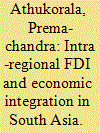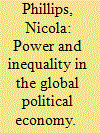| Srl | Item |
| 1 |
ID:
079841


|
|
|
|
|
| Publication |
2007.
|
| Summary/Abstract |
Asia Pacific economies - particularly Japan, South Korea, China and Singapore - play a large and growing role in the commercial aircraft industry, despite the fact that the region has no major independent plane-maker. Instead, Asia has secured a significant position in the increasingly elaborate global production networks of Boeing and Airbus. The wider Asian significance in those networks has been fostered not only by the region's deep capital and human resource assets but also by the catalytic actions of developmental states in the region. Moreover, decades of rapid air traffic growth have made Asia a crucial market for Boeing and Airbus. In response, the American and European giants have been compelled to outsource more of their business to Asia in order to win sales and to design new airliners tailored to the needs of Asian customers. Together, the increased importance of Asia in both the design and the manufacture of commercial aircraft point to a future in which Asia will capture an ever-larger share of the value created in one of the world's most technologically sophisticated and strategically significant industries
|
|
|
|
|
|
|
|
|
|
|
|
|
|
|
|
| 2 |
ID:
132517


|
|
|
|
|
| Publication |
2014.
|
| Summary/Abstract |
This article examines trends and patterns of intra-regional foreign direct investment (FDI) in South Asia, with a focus on the potential for integrating production processes among countries in the region through further trade and investment policy reforms. The empirical evidence pieced together from scattered sources suggests that horizontal (market seeking) FDI has continued to dominate South Asian intra-regional FDI, with a significant shift in recent years in favour of services sector activities. Vertical (efficiency seeking) FDI in the region has remained confined to a few product lines, predominately garments, and also a few industries in which the availability of specific natural resources plays an important role in the site selection decisions of firms. In other industries, including electronics and electrical goods in which global production sharing is heavily concentrated, there is no evidence of notable cross-border operations by regional firms.
|
|
|
|
|
|
|
|
|
|
|
|
|
|
|
|
| 3 |
ID:
188699


|
|
|
|
|
| Summary/Abstract |
Human rights in global value chains have become a key field of study in international law and corporate governance. The analysis often starts with a gap – a ‘governance gap’ in human rights protection. This pragmatic starting point calls for pragmatic solutions: better corporate compliance and more accountability. While this goes a long way in addressing corporate misconduct, the global corporate form, its power and legitimation in transnationally generating and appropriating value tend to become naturalized phenomena. Moreover, the effects of accountability agendas on corporate power and legitimation are hardly considered. Instead, I propose to address the ‘human rights problem’ by understanding the corporation and its networks as consequences of international politics – conceptualized as inter-societal multiplicity. The multiplicity lens offers a possibility to replace the governance gap with a productive conception of inter-societal conditions and can complement the focus on accountability and compliance. I conclude the article by tentatively sketching three important consequences of such a starting point for defining the problem of human rights in global value chains: the international dimensions of the division of labour under competitive conditions, the legitimation of corporate practices and the production of knowledge for their regulation.
|
|
|
|
|
|
|
|
|
|
|
|
|
|
|
|
| 4 |
ID:
153850


|
|
|
|
|
| Summary/Abstract |
Inequality in all its forms is the defining global problem and increasingly the defining political problem of our age. A monumental body of scholarly research seeks to understand the drivers behind the vast and accelerating patterns of socio-economic inequality in the global political economy. This article, an adapted version of the 2016 Martin Wight Memorial Lecture, contributes to this effort by focusing on a dimension of the picture which has received surprisingly little attention, namely, the implications for socio-economic inequality of the particular form of industrial organization that has come to underpin the contemporary global economy—one organized around global value chains and global production networks. It proposes an approach which sees inequality as arising at the intersections of three dimensions of asymmetry—asymmetries of market power, asymmetries of social power and asymmetries of political power—which underpin and crystallize around global value chains. It explores these dynamics in the particular arena of labour and labour exploitation in global value chains, as a means of shedding a valuable wide-angle beam on the big questions of power and inequality in the contemporary global political economy.
|
|
|
|
|
|
|
|
|
|
|
|
|
|
|
|